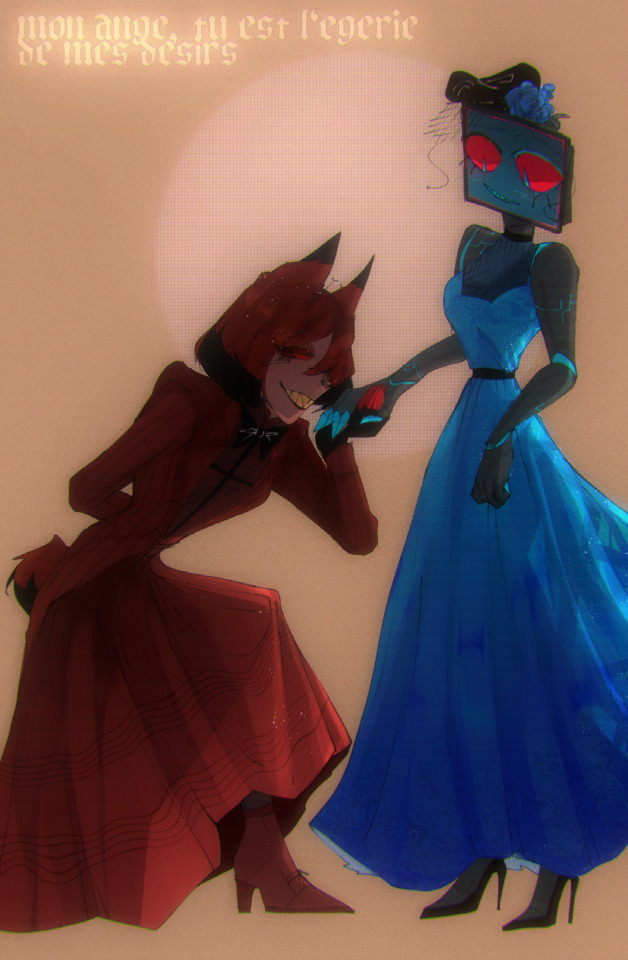#its supposed to be égérie
Text

penses-tu à moi ? rêves-tu de moi la nuit ? mes œuvres sont pour toi, m'égérie. regarde-moi, s'il te plait, juste une fois ?
better quality version under the cut:

#its supposed to be égérie#but ibis fonts dont support accents#also ive no idea if its contracted with the m' or if i keep it as ma#as you can probably tell 8yrs of french did next to nothing for me#🌗 art tag#hazbin hotel#radiostatic#hazbin vox#vox hazbin hotel#fem vox#hazbin alastor#alastor hazbin hotel#fem alastor
270 notes
·
View notes
Text
Mr. Lévy is France’s favorite punching bag. Legendary for wearing a black Christian Dior suit over an unbuttoned white shirt, the man who has had the ear of presidents since Francois Mitterand, no matter their political affiliations, was born into wealth and attended the best schools in Paris, getting his agrégation in philosophy. His counter-intuitive lightning rod 1977 book Barbarism With A Human Face was published at a time when the communist party was not only France’s main political opposition to the Gaullist right, that had been in power since World War II, but the main referent among intellectuals. In the eighties there was not one TV talk show producer who didn’t want to book the former Maoist and a few other of his friends, called the New Philosophers, such as Andre Glucksman and Pascal Bruckner. The new prime-time stars were eager to explain their sudden disdain of Marxism and full embrace of the crypto-fascist anti-USSR Tsarist Aleksandr Solzhenitsyn. Mr. Lévy’s father, who had made his fortune with Becop, a corporation importing rare wood treated in exploitative plants from the Ivory Coast and Gabon, where subpar wages and mass deforestation were the norm, financed his short-lived daily L’Imprévu while he was dating models. As with many neocons in America who had a leftist past, this newfound anti-Marxist discourse, which occurred while the USSR was invading Afghanistan, resonated throughout Europe like a Tickle Me Elmo fire sale in a Columbus, Ohio suburb.
Pretty soon Mr. Lévy was in Sarajevo dodging snipers’ bullets and having tea with Ahmad Shah Massoud in the Panjshir Valley. When he got stuck in Bosnia under Serbian shells, unable to fly to Saint-Paul-de-Vence to marry Eric Rohmer’s égérie Arielle Dombasle, he had President Mitterand send an air force jet to bring him to Provence on time.
“Don’t you think that’s why people hate you?” I asked him. “What was I supposed to do? Not get married?” he answered. “Mitterand owed me, I helped him save face in Bosnia. I did so much for the French government, in the name of the French government, that it was really the least they could do to help me fly there.”
Indeed, it was his idea to have the French president land unannounced at the Sarajevo airport in a show of force meant to calm the carnage taking place in the former Yugoslavia. Alas nothing came out of it, so grateful Mitterand was to the Serbs for their stance against Hitler during World War II and so helpless Europe thankfully is without an army. The slaughter kept on going in Europe’s backyard until President Clinton belatedly intervened and bombed Serbia.
Part prime-time buffoonery, part tourism diplomacy, Mr. Lévy was at least trying to end Sarajevo’s siege and help Massoud get international recognition and weapons. Never mind that people close to Massoud never heard of a meeting with Lévy and that a Bosniac TV crew staged an interview with the philosopher, replete with sniper soundtracks and faux dodgings.
“Democracies are not run by the truth,” Mr. Lévy told me.
...
No wonder that Mr. Lévy, a son of the Enlightenment, sees Voltaire as the light at the end of the tunnel. “My relationship to powers has always been the same,” he said, “I act as a real citizen, a citizen is somebody who considers that the power is at his service. They are here to serve us. We are users of the powers, they belong to us. We elect them we have the right to use them and when they act bad we have the right and the duty to disdain them.”
“That’s naïve what you just said,” I told him. Naïve but remarkably efficient. In 2011 Mr. Lévy went to Benghazi, camera in tow, when Gaddafi was about to squash a growing rebellion with mass killing at a time when Libya was already parceled out to tribes and warlords out of Tripoli’s grip. He sat down the first loudmouth he crossed paths with at the newly established Transitional Counsel, a guy named Mansour Saif al-Nasr, stood close to him to be on frame on camera and dialed president Nicolas Sarkozy, famous for wearing compensated shoes. A week later this traveling circus was at the Elysée Palace on Mr. Lévy’s own dime and in a month, after Sarkozy had convinced David Cameron and Barack Obama to join forces, French jets were pounding Gaddafi’s troops. Three months later Gaddafi was dead.
Today Libya is the most dangerous place on earth, a failed state, with ISIS free to set up shop in the north. The chaos is such that women and children from all over Africa jump by the hundreds on derelict boats and go drown in the Mediterranean Sea on their way to Eldorado Europe. “You knew that there were people in the Transitional Counsel that were former Gaddafi henchmen like Mustapha Abdeljalil who was his butcher in chief as minister of justice.” I told him, “It didn’t make you pause? Wasn’t the writing on the wall?”
“That’s not how power works. You don’t go around telling people the truth. People don’t vote for just the truth. If only it were that simple…You would tell them the truth and everything would get figured out. That’s not how people vote. They usually vote for the lies. They vote for economical reasons as Marx said, for very personal reasons as Freud said or because it suits their view of the world as Nietzsche said. I see these leaders I deal with and ask to intervene in some situations, all of them, as cards in my hand. With power things happen surgically, by piecemeal, one-time deals as Michel Foucault said. I was against the war in Iraq because no Iraqi asked Bush for help, to come in and topple Saddam. In Libya a vast part of the population was begging for our help. The chaos is a necessary step unfortunately in the birth of democracy. In the great scheme of things, 40 years is nothing for people to build a democratic constitution. We are not slaves to power, we can vote, we can take it.”
...
Many French people think Mr. Sarkozy used Mr. Lévy as a smoke screen and the decision to destroy Mr. Gaddafi’s power as a preemptive strike because the Guide was about to make public the tens of millions of dollars he had given to Mr. Sarkozy’s campaign for the presidency in 2007. Others point to the fact that his foreign minister at the time, and probable next French president, Alain Juppe, had already sent emissaries to Benghazi to reach out to the Transitional Counsel. Meanwhile as a result of the West’s intervention in Libya, mercenaries and weapons looted from Gaddafi’s military bases poured into the Islamist tribes’ hands in neighboring northern Mali and they all started marching on the capital Bamako in the south. President Hollande, who defeated Mr. Sarkozy in the meantime, sent troops to Mali to protect the Christian south and while he was at it to CAR, all of it according to The New York Times to get access to primary resources.
“The New York Times was wrong,” Mr. Lévy said. “There is nothing to grab in these countries and if this were the goal we would do what the Chinese are doing… come in slow and steady with a lot of cash and no weapons.” But the Chinese are sitting on half of the world’s currency debt and France is broke as Job. All of a sudden, while there is growing talk of a European military force, France is back all over northern and Sub-Saharan Africa with boots on the ground battling the same foe it tamed during its colonial past: Islam. Simultaneously, fascist parties are on the rise in every country across Europe and in some places like France and England they arrived first in the recent European elections. Colonial powers never run on liberal fuel. But what is the exact meaning of an expansionistic Europe in the age of verticality and globalization? England, one of the rare European countries growing out of recession, pulled back its troops from Afghanistan and refused to help France pay for its African folly. “Hollande was right to intervene in Mali and CAR,” Mr. Lévy said, “he had to fight terrorism there.” Wasn’t this one of Bush’s rationales to enter Baghdad? Wasn’t another one democracy export?
https://observer.com/2015/05/why-does-everyone-hate-bernard-henri-levy/amp/
1 note
·
View note